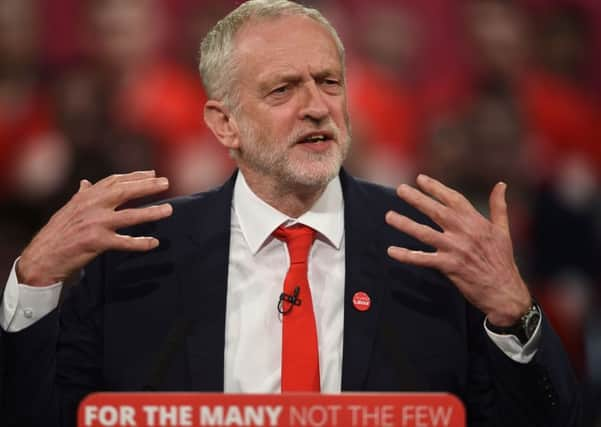Andrew Vine: Where Labour's many MPs could become the few


It’s “Every man for himself.” And if that sounds rather less high-minded or inclusive than the party line, it’s because of a grim pessimism about what could happen in a swathe of Labour’s heartland Yorkshire seats on June 8.
The thinking in regional Labour circles, according to a senior party figure, goes like this – the election is already lost, so the primary objective is to avoid being wiped out and hang on to as many seats as possible.
Advertisement
Hide AdAdvertisement
Hide AdAnd that means candidates conducting campaigns more akin to local than national elections – distancing themselves from a leadership proving a liability on doorsteps and emphasising their own credentials as constituency champions.
Then, when the Labour infighting and recriminations start after the Conservatives sweep to power with a much-increased majority, the survivors can play their part in rebuilding an electable party out of the wreckage.
It is not an approach that one Yorkshire Labour veteran – a long-standing acquaintance with no time for Jeremy Corbyn or his hard-left cohorts – relishes, but it is pragmatic.
He also finds it depressing. He’s been campaigning in elections for his party for more than 30 years, and for the first time in a national poll, he’s not fighting to get a Government elected on a programme he believes in because it would be good for the country, but simply for survival.
Advertisement
Hide AdAdvertisement
Hide Ad“It’s not about winning,” he told me. “It’s about hanging on to as much as we can, so it’s every man for himself.”
He knows that this is not the attitude of a united party ready to govern Britain. It is as much about the future direction of Labour after the election, the struggle between centrist and left-wing ideologies for control.
And if there was little appetite for this election in Yorkshire Labour circles, there is the sense that it will, at least, deliver such a decisive verdict against the leadership’s agenda that a fundamental rethink is inevitable.
The ‘every man for himself’ approach is borne out by the two leaflets so far from the Labour candidate in my constituency, which are telling in the distance they place between person and party. They are all about his record over many years as a conscientious and hard-working MP tackling local issues.
Advertisement
Hide AdAdvertisement
Hide AdThere is no reference to Mr Corbyn, and the emphasis on what Labour has to offer mainly concerns its achievements in power between 1997 and 2010, not what it aims for in 2017 and beyond. As a campaigning tactic, harking back to the Tony Blair and Gordon Brown years is pretty forlorn. So much has happened since 2010 that the last Labour government starts to feel very distant, and the early, optimistic period after the 1997 landslide like ancient history. Out on the stump, though, it’s an uphill struggle maintaining a distance between national and local.
Mr Corbyn’s name keeps coming up, not least because Theresa May has cast the election in almost presidential terms, repeatedly returning to the question of whether she or the Labour leader would make the best Prime Minister or who could get the best deal on Brexit.
However popular he is with party members who twice voted to make him leader, canvassing on Yorkshire doorsteps is only deepening the sense of foreboding within regional Labour circles.
Mr Corbyn is not playing well beyond his core supporters. That presents a dilemma for candidates, who cannot be seen openly repudiating the leader of their party. Even if they dared to do so, and risk any disciplinary consequences, it would undermine their own credibility in standing for Labour.
Advertisement
Hide AdAdvertisement
Hide AdThe rejoinder from voters, “Yes, but if I vote for you we might end up with him”, is an awkward one to bat away, especially from those who strongly supported Brexit and see Mr Corbyn as epitomising politicians who have been too soft on immigration.
And trying to turn doorstep conversations away from national issues onto local concerns risks making candidates look shifty and unwilling to talk about the bigger picture.
But the bigger picture being presented by the London-centric inner circle around Mr Corbyn is only serving to reinforce the notion that keeping it local is a better bet to maintain Labour’s presence in Yorkshire.
Inept performances by the likes of Diane Abbott and John McDonnell, in which spending figures are apparently plucked from the air and fail to stand up to scrutiny are making selling Labour’s message even harder.
Advertisement
Hide AdAdvertisement
Hide AdThere is little appetite for such prominent Labour figures to come north and campaign, because they would hinder, not help. So it comes down instead to every man – and woman – for themselves, hanging on seat-by-seat in an election haunted by the fear that for Labour in Yorkshire, the many could become the few.